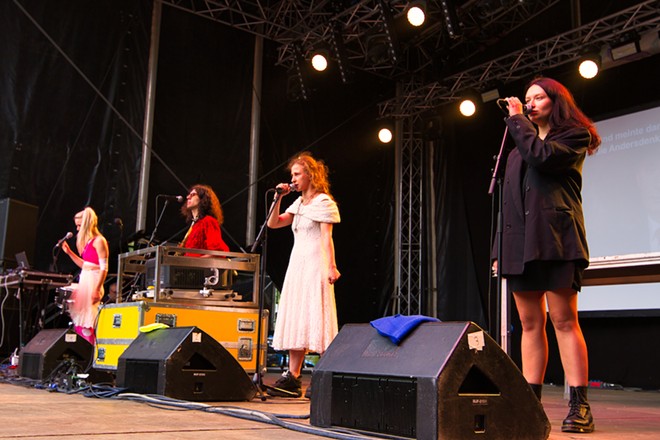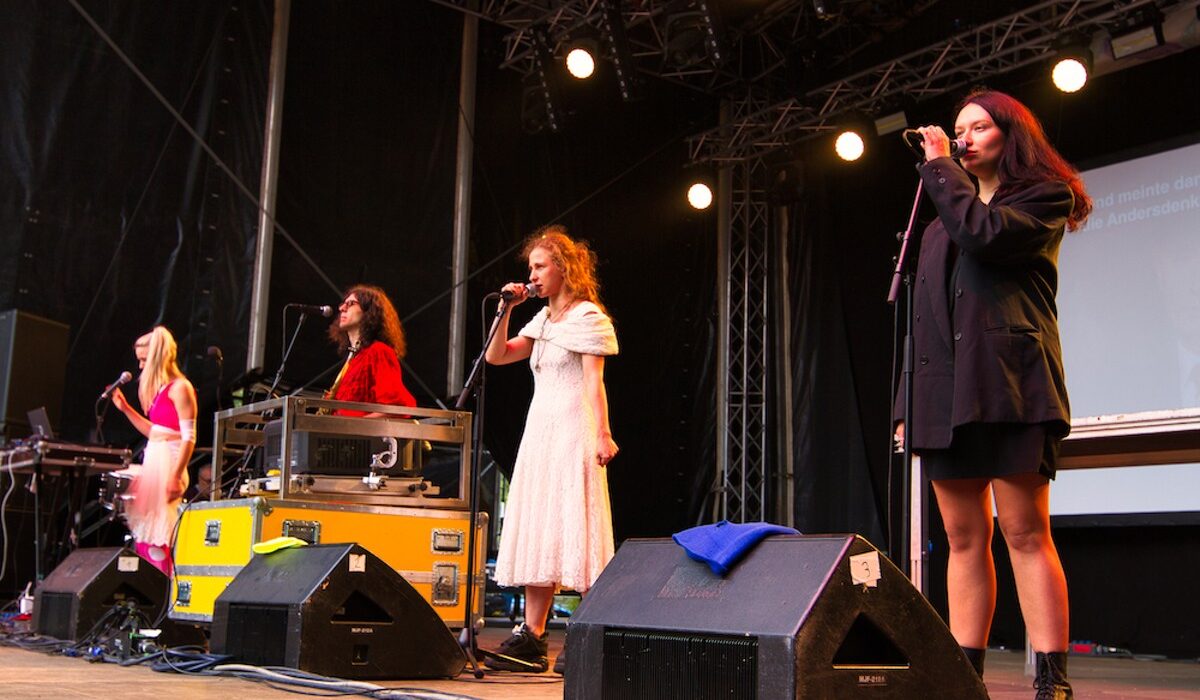
Wikimedia Commons / Schorle
Feminist collective Pussy Riot performs last year during a European festival show.
Feminist art-punk collective Pussy Riot is bringing its Riot Days tour to San Antonio.
The activist group will perform Friday, Nov. 24, at Paper Tiger as part of a series of U.S. road dates which are a self-described “mixture of concert, rally, theatre and political happening.”
The performance is based on Pussy Riot member Maria “Masha” Alyokhina’s memoir, which chronicles her experience in the group. That includes her time in a Russian prison for “hooliganism motivated by religious hatred,” a charge related to a 2012 performance inside a Moscow cathedral that drew the ire of President Vladimir V. Putin’s government.
For Riot Days, Pussy Riot’s membership will include Alyokhina along with Diana Burkot, Olga Broisova and Alina Petrova. Founding member Nadya Tolokonnikova isn’t involved in the current tour. A “significant portion” of proceeds from the dates will go to the Ukrainian Okhmatdyt Children’s Hospital.
Baltimore-based rock band Pinkshift will open the Paper Tiger performance.
The Current caught up with Alyokhina via phone from Montreal as she prepared to depart for the tour. She fled Russia last year as Putin cracked on dissidents amid the war in Ukraine.
Given the combination of performance art and protest involved in the Riot Days tour, why present the shows at rock music venues instead of performance spaces or art galleries?
Well, because it’s totally different from performances and art galleries. I’m actually now in the Montreal Museum of Contemporary Art and I’m building an exhibition, and I have experience with working in the museum and galleries. But our concert is basically a concert. It’s a multi-genre experience, which is built for the stage, and I mean, at least 60% is musical experience. And we have songs, we have video, which is on our back, and it’s a manifesto — so it’s just for the stage.
What would you like U.S. audiences to take away from the experience?
I think our main goal is to drive people, to inspire people, to do their own street actions, and to be politically engaged and just feel and understand that freedom is something they should fight for. Otherwise, it will just be talking out. And it’s not boring to be political. It’s interesting. It can be interesting, it can be fun, it can be hard, it can be unpredictable and just different. And we have a story of my imprisonment, but also my activism. Pussy Riot [can also help show U.S. audiences] what can happen if the country turns into an authoritarian state.
Are the things that we see Putin enacting a warning about where the United States is headed if we continue electing politicians who embrace totalitarian tendencies?
Yes, definitely. This is a reminder of what can happen. And also the whole world has seen what happened already with the United States during the Trump presidency. He was the only president of the United States, by the way, who was not blamed by Russian propaganda. So, he was the best friend of Russian propaganda during all his presidency. And this is a clear sign for the people to understand who he is and that he also is the good friend of Vladimir Putin, who is a pure terrorist. So, yeah, unfortunately if people do not fight for what they believe — for freedom and basically for democracy — it’ll be [taken away].
At the same time, Pussy Riot showed that there can be repercussions for speaking up against authoritarianism. You were imprisoned for your “Punk Prayer” performance, and you were also jailed a second time and put on a wanted list before you fled Russia. What inspired you to speak up even though you continued to see penalties for your activism?
We made “Punk Prayer” in 2012, which is actually 10 years ago. During this 10 years, I had a lot of different types of punishment, let’s say. So, I don’t have bank accounts. I have a lot of travel bans. I had a second criminal case and an electronic ankle [monitor] on my leg for a year and a half, plus a lot of imprisonments in different jails and detention centers. And to go to the third prison term for me was not, I mean, so big a problem. Actually, the bigger problem was to [leave] my country, which I know and I love, and I made [that decision] just for one reason: to help Ukraine as much as I can. And that was not an easy decision.
So, actually that was a main point for me to go here, to go to the West, to speak as loud as I can against Vladimir Putin, to show that without uniting all the world [against him], other countries will be attacked and more people will be killed and more houses will be just under bonds. And this is super clear for me, who was living in Russia all my life, and I want people to understand it as well and feel it.
As somebody who’s looking to unite people, has it been rewarding for you to be able to tour in Europe, the United States elsewhere and come into contact with audiences and other activists?
It’s super important to me to meet local activists, definitely. That’s one of our goals — to meet local people and local activists and support them and exchange our experiences. And that’s what we are doing for many years in Europe as well. Putin’s regime built an iron curtain for many years and we are doing totally opposite.
If you were to talk to somebody who’s a music fan but not necessarily interested in politics or activism, what would you tell them to get them interested in seeing the performance?
… I mean, actually, I can tell you one story. When I was writing Riot Days, me and Olya, who is also on the stage and who is an editor of the book, we were imagining some, let’s say, 18- or 19-year-old Argentinian girl who just doesn’t know anything about Russia or about Putin and actually doesn’t want to know about that. So, we were writing the book with this thought that we should turn this girl into politics, and — how to say it? — push her to be interested in what is going on in our country. So basically the idea of the book … was to wake up the interest in the people who do not have it yet.
You said one day you’d like to return to Russia when you feel it’s safe. What is it about Russia that makes you want to return?
Every month I have the same dream. I mean, it’s always different, but the sense is actually the same: that I’m going back. Not because I’m going back for forever. I’m just basically going back like I did a hundred-thousand times before. Normal people in the world live, they just travel and come back home. And that’s something which was taken away from me. Again, this is not a question of my safety, because during all these years I learned how to survive in prison, and sometimes it can be funny and interesting. I mean Russian gulag is a super tough experience, but if you go again and again, it became kind of different.
The main issue for me now is to show what [the Putin regime is] and what they want to build in the countries they’re occupying. Because Putin turned Russia into a huge gulag years ago. And territories which they are occupying, they turned into a gulag as well. I don’t want people to live like this, and I’m here to [raise awareness]. … I don’t know how this will all finish, but I feel I should do everything I can to finish it [for the people of] Ukraine, because they deserve it.
$30-$35, 8 p.m. Friday, Nov. 24, Paper Tiger, 2410 N. St. Mary’s St., papertigersatx.com.
Subscribe to SA Current newsletters.
Follow us: Apple News | Google News | NewsBreak | Reddit | Instagram | Facebook | Twitter| Or sign up for our RSS Feed

